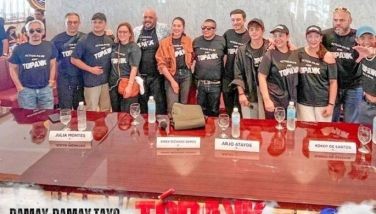Bye, Sol
One of the first celebrities I ever saw in real life was Redford White. I was a kid, and back then, celebrity sightings were hard to come by, unless you lived near where the stars were. My house was in a sleepy suburb in the middle of Nowhere, Southern Manila, and there was just no spot for any famous people to make an appearance in. That would change some years later, but as I was growing up, the only celebrities that were readily accessible were the ones who went to my school, like Ian Veneracion, or the ones that were invited to grace school affairs, like, um, Pong Pagong, Kuya Bodjie and Ate Sienna.
I don’t remember exactly where I saw Redford White. What I do remember is how surprised I was to see him in the flesh, standing in front of me, looking so familiar, like an uncle I could kid around with. And yet, when his eyes met mine, I didn’t register. I was expecting him to greet me like a long-lost friend, the one who’d followed his adventures closely in “Buddy en Sol” and laughed at his antics in “Iskul Bukol,” but I was a complete stranger and he was completely serious.
You know what they say about clowns and comedians, how they can make you laugh onstage, but off it, they may live such tragic lives? I hadn’t heard that when I saw Redford White, but when I finally did, it was the look on his face that came back to me and confirmed the truth in the statement.
He had this deeply somber look, which quickly vanished when someone cracked a joke and he had to respond with another one. I could never forget it.
When I grew up, he disappeared for a while from the scene. Eric Quizon, who was Buddy to his Sol, became a serious actor and then limited his performing altogether in favor of directing. His contemporaries, like Lito Pimentel, who was at his comedic best in “Ang Manok ni San Pedro,” shifted to soap operas.
When he came back, he was still the same Redford White, but this time in a more politically correct world. The jokes about skin color, physical appearances, and screaming parlor gays had become tired—or lived on only in institutions like “Eat Bulaga!” I wasn’t quite sure where he’d find himself, with a joke for a name, but he held his own quite well in gag shows like “Super Laff-In” and “Ispup” and sitcoms like “Home Along Da Airport” and “Daddy Di Do Du.” The guy was talented, and he didn’t even have to put anybody down to get some laughs.
I hadn’t heard he had brain and lung cancer. His exit was quiet, and, from what I’ve read, still jovial. Other articles on his death tell me that he was, in real life, a shy and quiet person who didn’t want to attract a lot of attention.
Reading about his death as an adult makes me realize even more how much he was a part of my childhood. Suddenly, there’s a roll call of names the likes of which we’ll never hear again: Redford White, Richie D’ Horsey, Palito, and Babalu. Suddenly, a host of movie titles we’ll probably never have again came to mind: Billy the Kid and the Sunshine Gid, Lost and Found Command: Rebels Without Because, Rambo Tan-go, Neber-2-Geder, Walang Matigas na Buto sa Gutom na Aso, Horsey-horsey: Tigidig-tigidig, and Inday Bote.
Thank goodness for the likes of Redford White. His real name was Cirpriano Cermeno II, and he was, before being an actor, a comedy writer. He silently succumbed to cancer. He made us laugh.
Email your comments to [email protected]. You can also visit my personal blog at http://althearicardo.blogspot.com. You can text your comments again to (63)917-9164421.
- Latest
- Trending



















